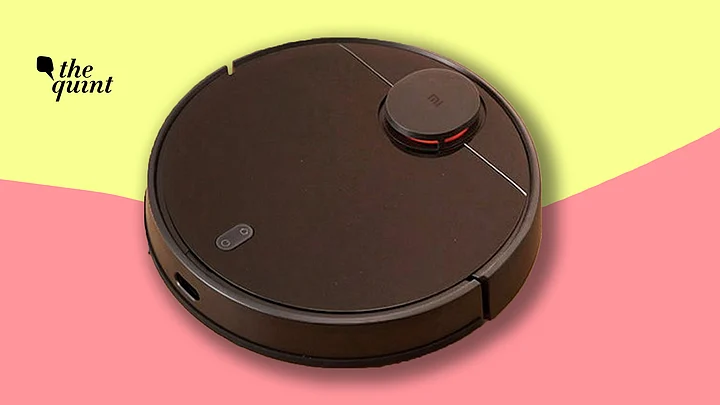With the rise in COVID cases in India and lockdown imposed in several states, an increasing number of Indian families in urban areas are opting for robotic cleaners to take care of domestic chores.
Pune-based home maker Vaishali Shinde, 38, purchased a robotic floor cleaner last week. “It is very hectic to clean the house every now and then, and without the help of maids it becomes quite a challenge for me,” she says, talking about juggling a number of domestic chores without much help.
Shinde learnt about robot vacuum cleaners from her friend in the United States. "I immediately looked it up online and bought the device. They are very easy to operate. You just have to switch it on and it automatically sweeps and mops the floor,” she adds, calling her bot ‘Ramu Kaka’ – a ubiquitous name for the man Friday of large families depicted in Bollywood flicks.
Demand for Robotic Cleaners Soar Amid Pandemic
Robotic cleaners have gained popularity in Indian homes as housing societies restrict the entry of domestic helps in the wake of the second wave.
These robots automate cleaning processes, are intelligent and capable of complex tasks such as identifying and alerting any misplaced objects, efficient path planning for floor cleaning, and identifying voice commands.
According to a Business Today report, about 10,000 floor cleaning robots were sold in India in FY2019-2020. Domestic robotic vacuum cleaner companies, Milagrow and iRobot comprised almost 90 percent of the sales. Priced between Rs 35,000-40,000 each, these cleaning bots were largely bought by hospitals to disinfect areas and keep wards clean, barely demanding maintenance.
But as the pandemic further intensified, cleaning robots gained popularity with urban residents, with more companies like Xiaomi and Trifo offering competitive prices.
At Rs 23,990, Trifo Ironpie was Amazon's top-selling robot cleaner for three successive months in late 2020. The California-based AI company partnered with Mumbai’s Cambium Retail to enter the Indian market, soon finding presence on the e-commerce sites, offering a wide range of entry-level to high-end models.
"We are aggressively planning to strengthen our offline retail channels, along with introducing more products and deepening our presence in Tier I and Tier II cities,” ANI quoted Founder and CEO of Trifo, Zhe Zhang as saying.
User-Friendly And Affordable
Chitra Gandhi, 42, an IT professional based in Pune, says keeping her home clean has proven to be an arduous task during the pandemic. "I have hectic working hours and maids were the only helping hands. But the apartment’s association isn’t allowing them anymore," she says.
Gandhi says that after her husband was diagnosed with COVID, she couldn’t find any time to dust, sweep and clean. "I knew about the existence of robotic cleaners through telemarketing channels but never thought that I'd really buy the device," she adds, relieved with her decision of investing in a robotic cleaner.
The Quint spoke to a number of cleaning robot users who said ease of use and affordable prices make these bots a clear winner.
Chitra Dedgaonkar, 27, a marketing professional in Mumbai told The Quint that she operates her robotic mop cleaner using an app on her phone. "You can control it from anywhere in the world even if no one is available at home. It cleans my entire 1500 square ft 3BHK apartment effortlessly without any human intervention. I am also quite impressed with the battery backup, I only have to charge it for an hour and the device cleans the whole area within 45 minutes. It is very time efficient and offers contactless cleaning which is much needed during such times."
Naman Jain, 54, a Pune-based Chartered Accountant believes that no human can clean the floor as good as robotic cleaners. "I got this device because I have a spine injury, due to which it becomes very difficult for me to mop the floor on my own. The robot doesn't take more than 15 minutes to clean. The robot is Wi-Fi enabled and you can start and stop cleaning jobs even if you are not home."
According to Yahoo finance, the robot cleaning market in India is expected to grow at a compound annual growth rate of 9.2% percent by 2026. As more Indian states impose curfews and lockdowns to contain the spread of infection, sales of these cleaners are expected to shoot up.
In an interview to Financial Express, Gopal Jeyaraj, Head (India & SAARC), Anker Innovations said that when the company was launched in 2019, they were selling 50-100 robotic vacuum cleaners in a quarter. However, once lockdown was announced in 2020, and people realised that normalcy would take time, the demand picked up. "We are doing 20 times more orders every quarter now," he said.
Asked if the performance of these cleaners beat the traditional mop and broom, Gandhi says, "It depends on your house, what kind of floors you have and how you operate the device. I can't say if it is better or worse, but it really does make it easy in comparison to actually mopping and sweeping the floors."
(At The Quint, we question everything. Play an active role in shaping our journalism by becoming a member today.)
